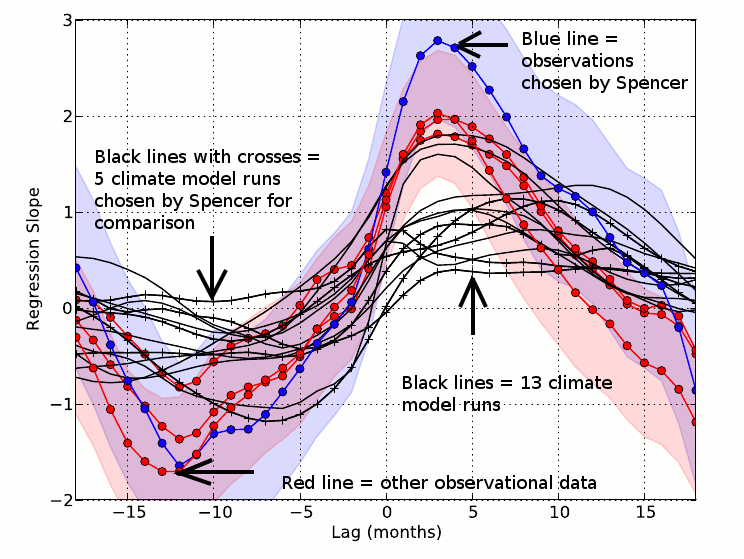Andrew Dessler's New Paper Debunks Both Roy Spencer And Richard Lindzen
Posted on 6 September 2011 by Rob Painting, dana1981
Andrew Dessler, a climate scientist at Texas A&M University, has released a scientific paper (Dessler 2011) that looks at the claims made by two of a small group of "skeptic" climate scientists who regular SkS readers will be familiar with: Roy Spencer and Richard Lindzen. Both were co-authors on peer-reviewed papers released this year (Spencer & Braswell [2011] & Lindzen & Choi [2011]) which, once again, sought to overturn the orthodox view of climate. Dessler (2011) finds that the conclusions of these two papers are unsupported by observational data.
Spencer & Lindzen: Tipping reality on its head
The Spencer/Braswell and Lindzen/Choi papers have an unusual take on global warming: rather than warming causing a change in cloud cover (i.e. acting as a feedback to either increase or reduce warming), both papers claim that it's the other way around - changes in cloud cover cause changes in the surface temperature (in the present case, warming).
Spencer/Braswell and Lindzen/Choi look at the relationship between changes in ocean heat, cloud cover (directly affecting the amount of heat lost to space), and global surface temperature over recent decades. The idea is, if the change in surface temperature over that period is affected by changes in cloud cover, but changes of the surface temperature associated with the ocean warming are small, then changes in cloud cover must be driving the present global warming.
Dessler: Putting reality back on its feet
Putting aside the problems with their energy budget equation, Dessler looks at the values Spencer/Braswell and Lindzen/Choi use for their calculations. Rather than examine the data for two of the terms in their equation (heating of the climate by the ocean & change in cloud cover allowing heat to escape to space), Lindzen and Spencer approximate them from other observations, and their results rely heavily on assumptions about the size of these values.
Rather than rely on assumptions, Dessler uses other observational data (such as surface temperature measurements and ARGO ocean temperature) to estimate and corroborate these values. Dessler finds that, in contrast to Spencer/Braswell and Lindzen/Choi, the change in cloud cover is far too small to explain the short-term changes in surface temperature, explaining only a few percent of surface temperature change. In fact, the heating of the climate system through ocean heat transport is approximately 20 times larger than the change in top of the atmosphere (TOA) energy flux due to cloud cover changes. Lindzen and Choi assumed the ratio was close to 2, while Spencer and Braswell assumed it was close to 0.5.
Dessler finds that the short-term changes in surface temperature are related to exchanges of heat to and from the ocean - which tallies well with what we know about El Niño and La Niña, and their atmospheric warming/cooling cycles.
Spencer & Braswell: A classic example of cherrypicking
In order to claim that the climate models differ from observations when comparing the surface temperature and energy leaving the Earth at TOA with the lead-lag between them, Spencer/Braswell cherrypick observational data and model results that show the greatest mismatch (Figure 1).

Figure 1: Dessler (2011) reconstruction of Spencer & Braswell's figure 3, showing relationship between top-of-atmosphere (TOA) net flux and surface temperature, as a function of lag between them. The blue line is the observational data chosen by Spencer and Braswell. The red lines show other available observational data. The shading represents the two-sigma uncertainty of two of the data sets. The black lines show climate model results. The black lines with crosses show the climate model runs chosen by Spencer and Braswell in their paper.
The blue line in Figure 1 is the TOA and Hadley Centre surface temperature data chosen by Spencer/Braswell, and the red includes other datasets of the surface temperature. The black lines are the 13 climate model runs, with the 'crosses' indicating 5 of the 6 models analysed by Spencer/Braswell. Although Spencer/Braswell analyzed 14 models, they only plotted the 3 with highest and 3 with lowest equilibrium climate sensitivities.
In the process, Spencer and Braswell excluded the three climate model runs which best matched the observational data. Dessler found that these three model runs were also the ones which are among the best at simulating El Niño and La Niña, which is not surprising, given that much of the temperature change over 2000-2010 was due to the El Niño Southern Oscillation (ENSO). Thus Dessler concludes that
"since most of the climate variations over this period were due to ENSO, this suggests that the ability to reproduce ENSO is what's being tested here, not anything directly related to equilibrium climate sensitivity."
Violating the Laws of Thermodynamics
Dessler also examines the mathematical formula that both studies use to calculate the Earth's energy budget, and finds that it may violate the laws of thermodynamics - allowing for the impossible situation where ocean warming is able to cause ocean warming.
Much ado about nothing
The short-term change in surface temperature over the 2000-2010 period is a result of ocean heat being exchanged with the atmosphere (via ENSO). This in turn alters atmospheric circulation, which alters cloud cover, but the impact of cloud cover on surface temperature only explains a small percentage of the surface temperature change. Thus the lead-lag relationship between heat leaving the Earth at TOA and surface temperature reveals nothing about what is driving the short-term surface temperature change.
In short, the "skeptic" hypothesis that changes in cloud cover due to internal variability are driving global warming does not hold up when compared to the observational data. Once again we have two heavily-hyped "skeptic" papers that have failed to live up to their billing.































 Arguments
Arguments






























[DB] Camburn, the inescapable conclusion one draws from Dessler's paper and your comments on it is that you simply do not understand what it is you are reading.
[DB] Embedded video in the OP at the end.